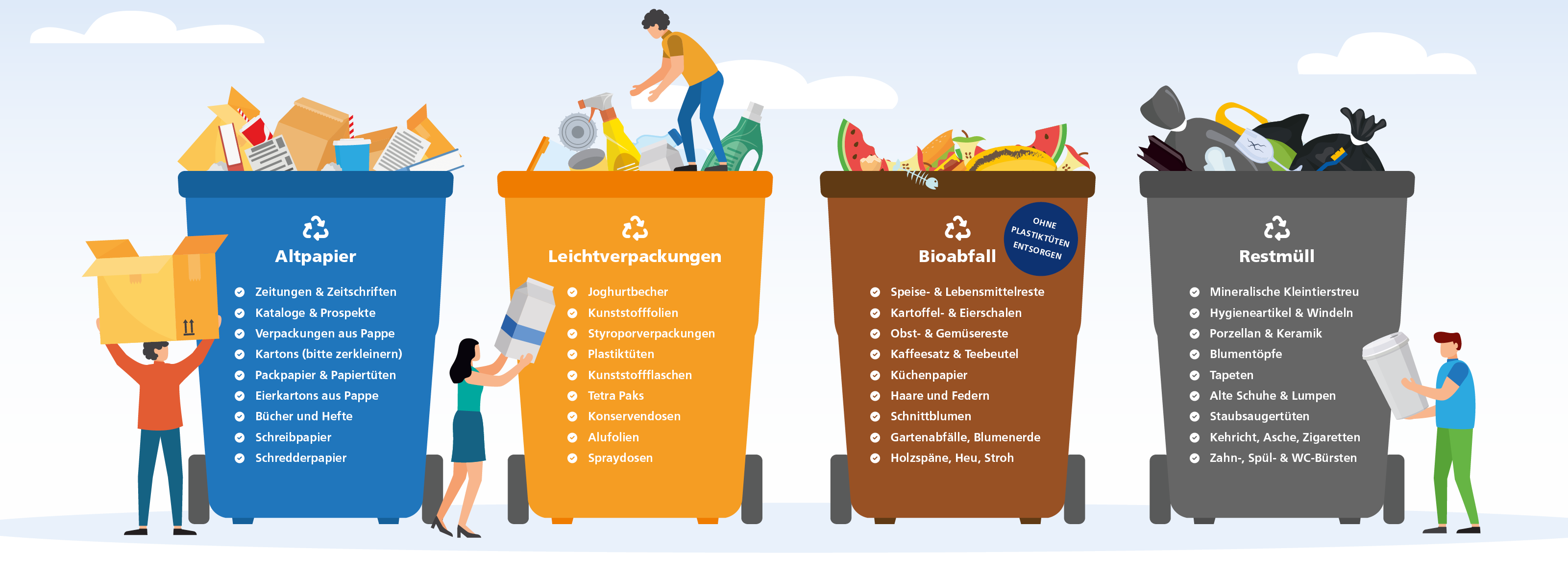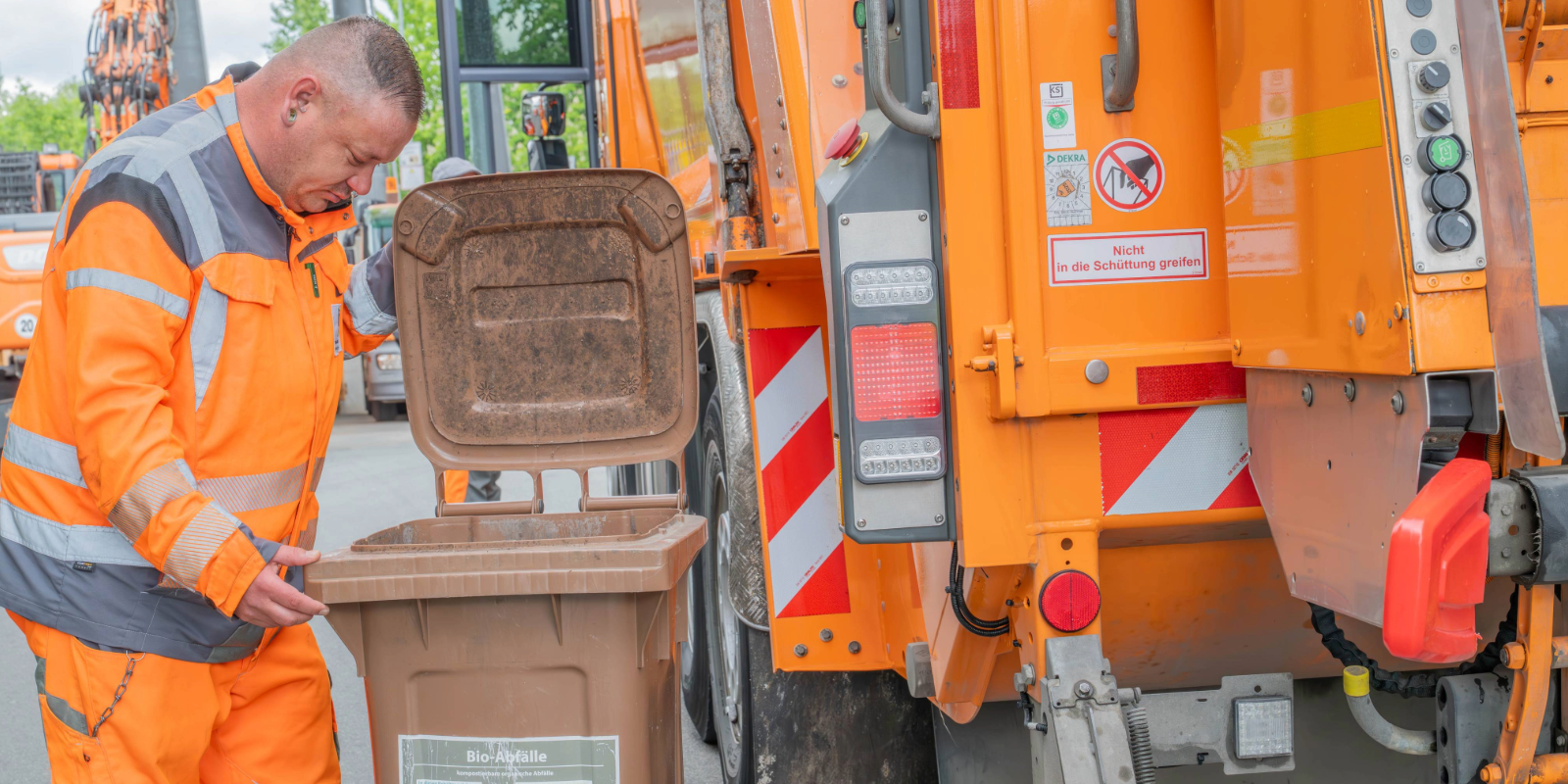When waste is disposed of properly, waste dump sites remain clean, unpleasant odors are avoided, and vermin are not attracted. This makes everyday life more pleasant for everyone. Unfortunately, yellow bags often end up in the paper bin or plastic bags in the organic waste bin. Or, even worse, right next to the bin. This makes our waste disposal time-consuming and expensive—and it affects the living environment.
Proper separation therefore not only protects the environment, but also the community on your doorstep. Please make sure you put your waste in the right bins, break down cardboard boxes, and do not simply leave bulky waste lying around. Even small gestures can go a long way toward creating a clean and livable environment. Thank you for your participation!

Waste disposal - paper, organic etc.
You can help to reduce the impact on the environment and conserve resources by separating waste correctly. For example, if paper, plastic or glass are collected separately, these materials can be recycled and reused instead of ending up in landfill.
Every contribution counts! If all tenants join in and sort the waste correctly, we can make a big difference together - for us and for the next generation. By separating your waste properly, you actively help to reduce energy consumption during recycling and cut CO₂ emissions. This not only makes our immediate environment cleaner, but also makes an important contribution to global environmental protection.
Take responsibility together – for your neighborhood, for nature and for a sustainable future!
Information on waste separation in German and English
Information on waste separation in German and Arabic
Residual waste
Sanitary products, diapers, mineral-based small animal litter, toothbrushes, porcelain, vacuum cleaner bags, soiled packaging, cigarettes, broken shoes, rags, flowerpots
Organic waste
Fruit and vegetable waste, food waste, eggshells, coffee grounds, filter bags, tea bags, kitchen paper, hair, feathers, cut flowers, potting soil
Lightweight packaging
Yogurt cups, plastic film, plastic bags, plastic bottles, Tetra packs, tin cans for food and drinks, aluminum foil, aerosol cans, polystyrene packaging
Waste paper
All paper packaging, cardboard and paperboard (please shred this), books, newspapers, magazines, catalogs, leaflets, letters, wrapping paper and paper bags
Organic waste - how to do it right!
Since May 2025, stricter rules apply for the organic waste garbage can. Anyone who throws plastic in the garbage can risks having garbage cans left standing and rising service charges. What many people don't know is that even small amounts of plastic in organic waste can have major consequences for the environment and for waste collection. Even plastic bags with the label „compostable“ often decompose far too slowly and cannot be reliably sorted out in the composting facility. This leaves all organic waste unusable.
Clear guidelines for less foreign substances
With the new Organic Waste Ordinance, a clear limit applies nationwide: A maximum of one percent plastics may be contained within the organic waste. In total, all foreign materials - including glass, metal or other packaging - may make up no more than three percent of the weight. If this limit is exceeded, the organic waste garbage can will not be emptied.
If a garbage can then has to be disposed of separately due to contamination, this results in additional costs that affect the operating costs and therefore ultimately affect all tenants. Please help to avoid such additional costs.
By the way: Kommunalservice Jena (KSJ) delivers the collected organic waste to a certified composting facility in Schöngleina. There, high-quality substrates and valuable soils are produced from cleanly separated organic waste - an important contribution to the circular economy. Contaminated organic waste, on the other hand, cannot be recycled and must be disposed of at a charge.

Please dispose of your organic waste loose or in paper – for example in newspaper, paper bags or special organic waste bags made of paper, but never in plastic – even if they are labeled as „compostable“. In this way, you help to protect the environment, save costs and make sensible use of valuable resources.
How to dispose of your bulky waste correctly
Many discarded items do not fit into the waste garbage can, but can be collected free of charge by the municipal service "Kommunalservice Jena" (KSJ) on an agreed date after prior notification . You should keep a few important points in mind:
-
Always register your bulky waste yourself! Do not simply dispose it in your neighbor's bulky waste pile. The KSJ will only take the bulky waste that has actually been registered. After registering, you will receive a collection date within 2-4 weeks.
-
Prepare the bulky waste in time: Place your items on the street at the earliest the evening before collection - but not in the hallway!
-
Pay attention to the permitted items: Only registered bulky waste will be collected. Permitted items include furniture, mattresses, baby carriages, lamps, bicycles, suitcases, gas stoves, sports equipment and more.
-
Avoid illegal dumping of waste: The unauthorized dumping of unregistered bulky waste pollutes the residential environment and is punishable as an administrative offence.
Contact
Municipal Service "Kommunalservice Jena"
Löbstedter Straße 56, 07749 Jena
Phone 03641 498-9510
Mail sperrmuell@jena.de
For more information and a registration form, please visit the KSJ website:
Sperrmüll Entsorgung (German)
Waste Disposal (Russian)
Waste Disposal (English)
Waste Disposal (Arabic)
This belongs in the bulky waste:
- furniture
- Non-metallic household items
- Scrap and metallic household goods
- Wood from furniture and furnishings
And this does not:
- Electrical devices & electronic devices
- hazardous waste
- Polyvinylchlorid flooring (PVC)
- Regular household waste/residual waste
- Construction waste and building site rubbish
- Ceramics
- Tree and shrub pruning
- Waste textiles
Used clothes and shoes – please dispose them correctly!
Clothing and shoes that are still wearable should not be disposed of in residual waste, but in the waste clothing containers provided for this purpose (EU Disposal Directive, 01/2025). They will be collected there, reused or professionally recycled. Please place the clothing clean, dry and in a sealed bag in the container. Shoes should preferably be wrapped in pairs so that they do not get lost.
Important: Do not place any bags next to the container. Wind and weather make the clothing unusable. It can then neither be donated nor recycled and has to be disposed of at great expense. This is not only a burden on the environment, but also on the general public. Only items that are no longer wearable, such as badly damaged textiles, individual shoes or torn bed linen, go in the residual waste bin.

